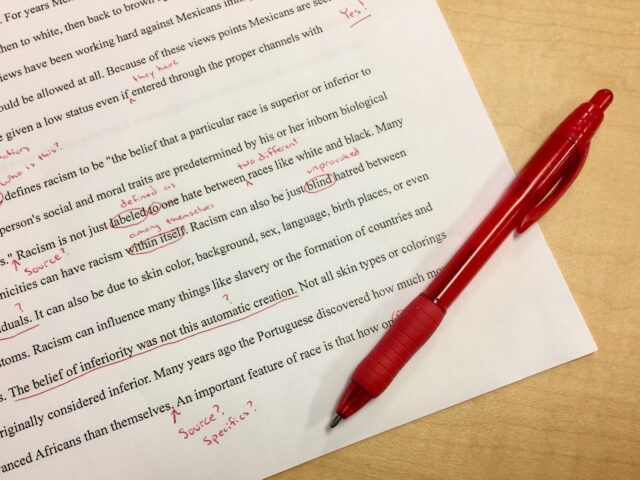
Essays don’t have to be four-letter words! With these study tips, you’ll have your essay done in no time – and it might be the best one your professor reads this semester. So, take a deep breath, plug in your earbuds, and get ready to write like a champion.
Writing
Writing an essay can be a daunting task and writing it quickly can seem even more challenging. But, with the right preparation and organization, it’s possible to write an essay in just one hour. One option to consider is using essay writing services to get a head start on your essay. These services can provide you with a well-written and properly researched essay that you can use as a guide.
First and foremost, you need to familiarize yourself with the topic at hand. Read through the assignment thoroughly and be sure to ask your professor any questions you may have before beginning your essay.
Outline your ideas on paper and make sure that your thoughts are organized in a chronological fashion. Remember, clarity is key when writing essays, so think about how you’re going to present each point individually in order for it all to come together.
Brainstorming

Brainstorming is an important part of this writing process. It’s a creative way to come up with ideas and decide on a topic. During brainstorming, you can generate different points of view, new questions you may want to explore, and additional resources you can use in your essay.
To get started on the brainstorming process:
- Take a few minutes to think about your subject matter. What themes can you identify? What are some possible titles for it? Do any particular topics spring to mind?
- Create an outline of the key points that you would like to discuss in your essay. Jot down any ideas or notes that come to mind that could be used as evidence or support for each point.
- Create a list of keywords related to the topic of it and combine them into clusters or groupings related to each other’s meanings. This technique can help expand upon ideas and reveal new connections between concepts that weren’t immediately obvious before.
- Check out other essays written by people who have tackled the same topic as yours or find sources that could provide helpful background information specifically related to what you want to write about in your paper. This allows you to gather evidence and discover different perspectives that could be applied when constructing arguments throughout it.
Outlining
Outlining is a crucial step in the essay-writing process, as it helps you organize your thoughts and ensure that all of your points are on track. This can be daunting, especially if you have lots of ideas that you want to include but don’t know how to structure them.
However, an outline doesn’t have to be overly complicated. Just break down your points into simple segments and order them logically, making sure each point relates back to the overall thesis of your essay. Here are a few steps for creating an effective outline:
- Recognize Your Outline Format: Before starting your outline, it’s important to think about what type of format you want to use. The most common formats used in college essays are APA, MLA, or Chicago. Make sure you select the correct format and follow the instructions accordingly.
- Get Started Writing: Begin by writing some notes or brainstorming ideas related to the topic of your essay. Don’t worry too much about structure right now; just focus on putting down any ideas that come into your head.
- Order and Organize: Once you have some notes jotted down, begin ordering them logically in an outing format. These could work as subheadings or body paragraphs – just come up with something that will help structure each point and keep everything organized!
Editing

Though many students dread the editing process, it is an important step before submitting any piece of writing. Editing can help improve the quality of your work by ensuring that your ideas are logically organized, your language is clear and concise, and your paper follows the appropriate writing conventions. Below are some tips for efficiently editing essays to ensure that you submit a top-notch paper in no time!
- First read through the essay to get a general understanding of its organization and meaning.
- Check for typos and spelling mistakes by using an online spell checker or print out a copy and use a standard dictionary to look up any words you’re unsure of.
- Make sure your sentences are complete by adding auxiliary verbs when required and omitting unnecessary filler words (such as “that”).
- Watch for redundancies or phrases that can be simplified such as replacing ‘as a consequence of’ with ‘because’ or ‘in spite of’ with ‘despite’.
- Verify that pronouns have been used correctly throughout the essay (the pronoun should clearly reference its antecedent).
- Ensure all facts and statistics used in the essay are accurate, valid, and cited appropriately according to your professor’s instructions if applicable.
Proofreading

Proofreading is an important step when writing an essay, or any other material. It is a vital part of any writing process and should never be overlooked.
When proofreading, you should look for mistakes in punctuation, grammar, spelling, and organization. To make sure your writing is perfect, read it through once more after you have finished writing. Carefully check for errors, seek out any inconsistencies and correct them as quickly as possible. If you need the essay in a very short space of time, consider using the services of an online proofreading service to detect errors that may have otherwise been missed.
Conclusion
The most important part of writing essays quickly is to have an organized system for the tasks. Break the essay down into three main parts: researching the topic, organizing your thoughts, and writing the actual essay. With this organization in mind, it will be easier to stay on task and complete your essay quickly.
Also, be sure that you are well-rested before you start so that your body and mind are able to work efficiently. Finally, use a trusted source such as a professor or librarian if needed. They will be able to help point you in the right direction if you need more clarification or help with an area of your research or outlining process.
With these steps, hopefully writing fast essays has become much easier and less daunting!













